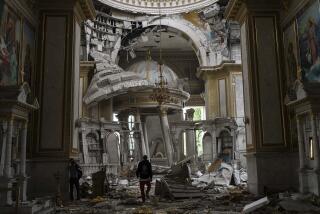A Counterfeit Industry Cheats Legitimate Trade
Millions of cigarettes waiting to be smoked fill the battered stands that line one street in this border city. Stacks of cartons announce the names of brands known the world over.
Of course, the 40-cents-per-pack Marlboros are not really Marlboros. Nor are the 30-cents-per pack Fox Lights, a brand popular in Brazil, authentic. They are all locally produced counterfeits, part of an illicit cigarette industry that is, at once, a major source of income to thousands in this impoverished country and also a national embarrassment.
The cigarettes are aimed chiefly at the market in Brazil, just a few hundred yards away. Every day, crowds of Brazilian shoppers venture into Ciudad del Este across the Bridge of Friendship spanning the Parana River that divides the two countries in search of bargains in a place famous for the counterfeit and the contraband, from television sets and telephoto lenses to ammunition and eau de cologne.
Paraguay’s recently installed president, Nicanor Duarte Frutos, has promised to do all he can to stop the factories that churn out the fake cigarettes, calling them a symbol of his country’s reputation for rampant corruption. Besides violating international copyright laws, the president said, the tobacco firms are not paying local taxes.
“Our government proposes the moralization of public functions and the end of impunity for government functionaries and for individuals who violate the law and steal from the people,” he said in February. “If we don’t fight these things, there is no future for Paraguay.”
Duarte Frutos was also acting under pressure from the world’s biggest tobacco companies, and from Brazil, the United States and the European Union. The Brazilian tobacco industry estimates that a third of the 143 billion cigarettes sold in that country in 2002 were counterfeit, mostly from Paraguay and Uruguay.
In 2003, British American Tobacco shut down its factories in Paraguay, saying piracy was driving it out of business.
“It’s hard to compete when there are more than 30 pirate factories, which are exempt from any tax oversight or criminal investigation,” the company said in a statement. Company officials also complained that when police do confiscate counterfeit cigarettes, judges often intervene and return the cigarettes to the producers.
Duarte Frutos took office in August. In February, federal police raided several factories in the town of Hernandarias, just outside Ciudad del Este, which, besides being the center of Paraguay’s illicit cigarette industry, is also famous locally for its enormous anthills.
Anthills the size of small children rise around the gated factories that dot Hernandarias. A powerful aroma of tobacco wafts through the air, drifting over faceless concrete buildings surrounded by barbed wire and guard towers. A reporter who knocked on one gate was waved away by a security guard.
In their February raid, Paraguayan officials discovered counterfeit cigarettes at three plants. The cigarettes were confiscated, and government officials now oversee the factories. But residents said that the owners of other factories were warned of the raids and hid their merchandise.
The raids have continued in recent weeks. Among the targets was a printing plant that produced the ersatz cartons and tax stamps.
“How can we hope for international companies to come and invest in our country when we are falsifying their very same products in our country?” asked Nelson Alcides Mora, Paraguay’s top prosecutor. “In the case of the tobacco plants, everything is falsified: the filters, the paper, the [tax] stamps.”
Despite the raids, the sale of counterfeit cigarettes continues unabated in Ciudad del Este, especially on San Blas Avenue just a few blocks from the Bridge of Friendship. Large delivery trucks and small vans, stacked top to bottom with boxes of cigarettes, crowd the streets, competing for parking spaces with trucks filled with impossibly cheap television sets, jeans, refrigerators and other products.
“Here, the only truth is falsification,” Martin Caparros, a Buenos Aires journalist, wrote recently of Ciudad del Este. “The streets and the stands and the stores overflow with fake products: with fake shoes, of course, and fake French perfumes ... and fake Energizer batteries and fake soccer jerseys and [Louis] Vuitton bags that are perfectly false and cigarette lighters and watches and liquor that are all false.”
Each day, groups of young men known as sacoleiros (bag carriers) carry 30-pound sacks filled with cigarettes across the Bridge of Friendship, smuggling them into Brazil in broad daylight.
They walk to within a few dozen paces of Brazilian customs officials and dump their bags of pirated cigarettes off the bridge. The bags fall 100 feet or so to the riverbank below, where other young men pick them up.
An 18-year-old sacoleiro, who appeared to be a leader of a group that included three other young men, talked loudly into one of two cellphones he was holding. “This work is dangerous,” he said. Between calls, he recounted a story told on the streets here, which may be apocryphal: Not long ago, a child working as a sacoleiro was killed while trying to catch one of the falling sacks filled with counterfeit cigarettes. Others, it is said, have drowned trying to recover sacks that have fallen into the river.
More to Read
Start your day right
Sign up for Essential California for news, features and recommendations from the L.A. Times and beyond in your inbox six days a week.
You may occasionally receive promotional content from the Los Angeles Times.







